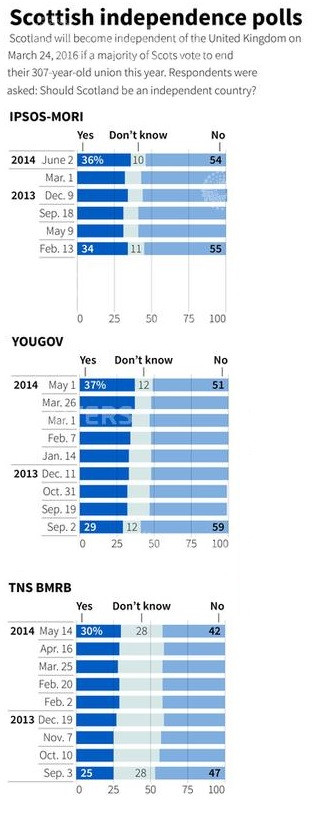Scottish Independence: No 'Energy Bonanza' for Salmond as Shale Gas and Oil Reserves Low

The latest British Geological Survey (BGS) data has debunked Alex Salmond's promises of an energy-rich independent Scotland, revealing there are only "a modest amount" of shale gas and oil reserves.
The report assessed the potential reserves of fuel in Scotland and found that the country only has six billion barrels of shale oil and 80 trillion cubic feet of shale gas in the centre of the country.
Nationalists have used the country's energy reserves as a key argument in championing a break from the 307-union. However, the BGS report showed levels to be significantly lower than the 1,300 trillion cubic feet of shale gas in the north of England.
On top of that, the report says that the amount of oil and gas that could be commercially recovered is expected to be "substantially" lower.
"The complex geology of the area and historic mine workings mean that exploratory drilling and testing is even more important to determine how much can be recovered," said the report.
"The relatively complex geology and relatively limited amount of good quality constraining seismic and well data result in a higher degree of uncertainty to the Midland Valley of Scotland shale gas and shale oil resource estimation than the previous Bowland-Hodder and Weald Basin studies."
Scottish people will vote in an independence referendum on 18 September this year and will be asked the straight "yes/no" question: "Should Scotland be an independent country?"
The referendum period started on 30 May.
The Jewel in the Salmond's Crown
Scotland's oil industry is arguably the jewel in Alex Salmond's crown. The National Institute of Economic and Social Research (NIESR), citing figures from the Scottish government, said around two thirds of all income from profits and employment due to the North Sea oil and gas industry were retained in Scotland to a tune of over £10bn (€12.5bn, $17bn) in 2010.
However, these latest figures show that Scotland's long term energy revenue predictions may not be as solid as Salmond claims.

"Making the most of Britain's home grown energy is crucial to keep job and business opportunities, widen tax revenues and reduce our reliance on foreign imports," said UK energy minister Michael Fallon. He added that shale gas and oil reserves would not provide "an energy bonanza".
"We know that shale gas alone won't be able to supply all our energy needs, but the environmentally responsible exploration of shale gas could contribute to our energy mix."
"Only the broad shoulders of the United Kingdom can attract investment in new energy sources and maintain the UK's position as one of the world's great energy hubs - generating energy and generating jobs."
The Organisation of Petroleum Exporting Countries (Opec) revealed that the average oil output in 2013 from the North Sea registered its lowest level since 1977.
This represented a roughly 10% decline from the previous year of 90 thousand barrels per day (tb/d).
Meanwhile, The Institute for Fiscal Studies (IFS) claimed that Scotland would borrow more money if voters decided to break away from the rest of Britain, as dwindling oil revenues and the short-term benefits of the UK recovery would fail to make it onto its balance sheet.
"If the OBR is right then it looks like the gap between public spending and tax receipts will be bigger in Scotland than in the rest of the UK after 2012-13, even when Scotland is assigned most of the oil revenues," said Paul Johnson, director of the IFS.
"In these circumstances even the very tight policies proposed by the current UK government which, if carried out, would take UK public finances back to balance by 2018-19, will not be enough to achieve budget balance in Scotland".
© Copyright IBTimes 2025. All rights reserved.


















